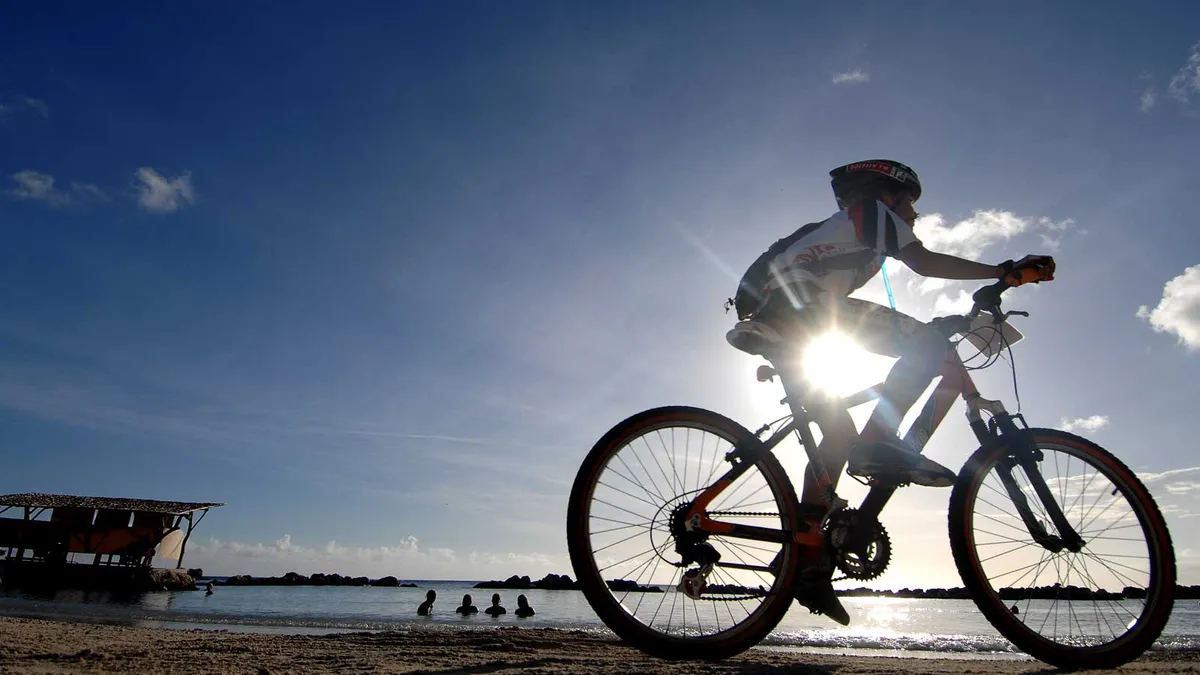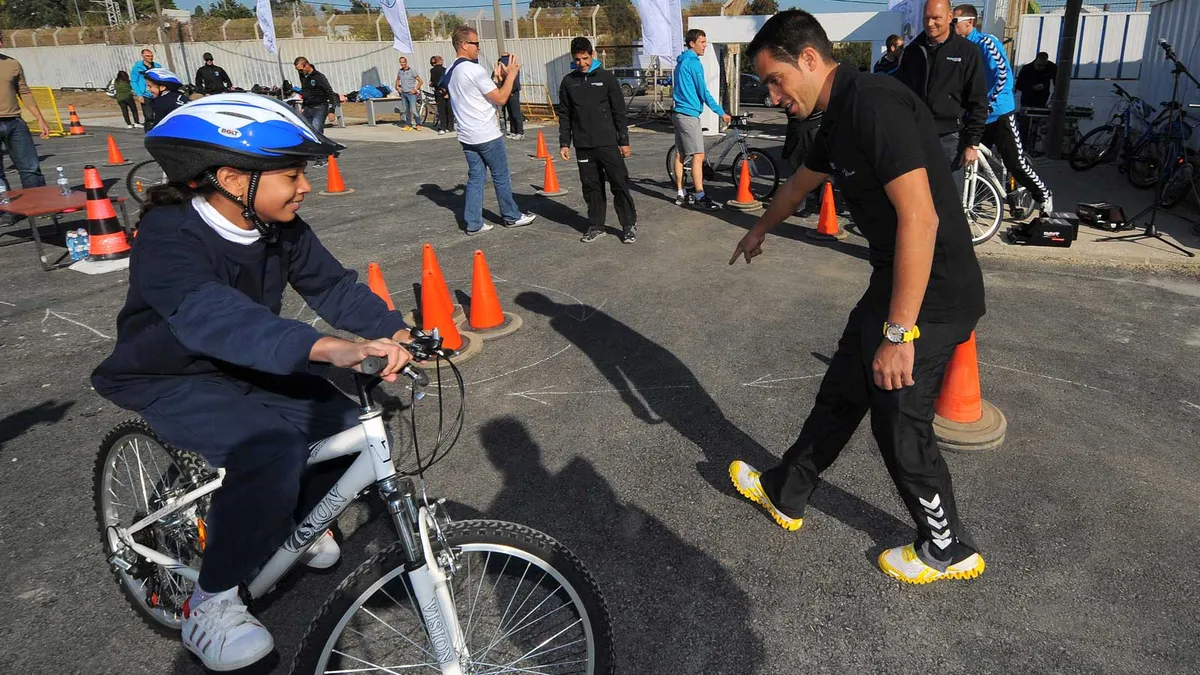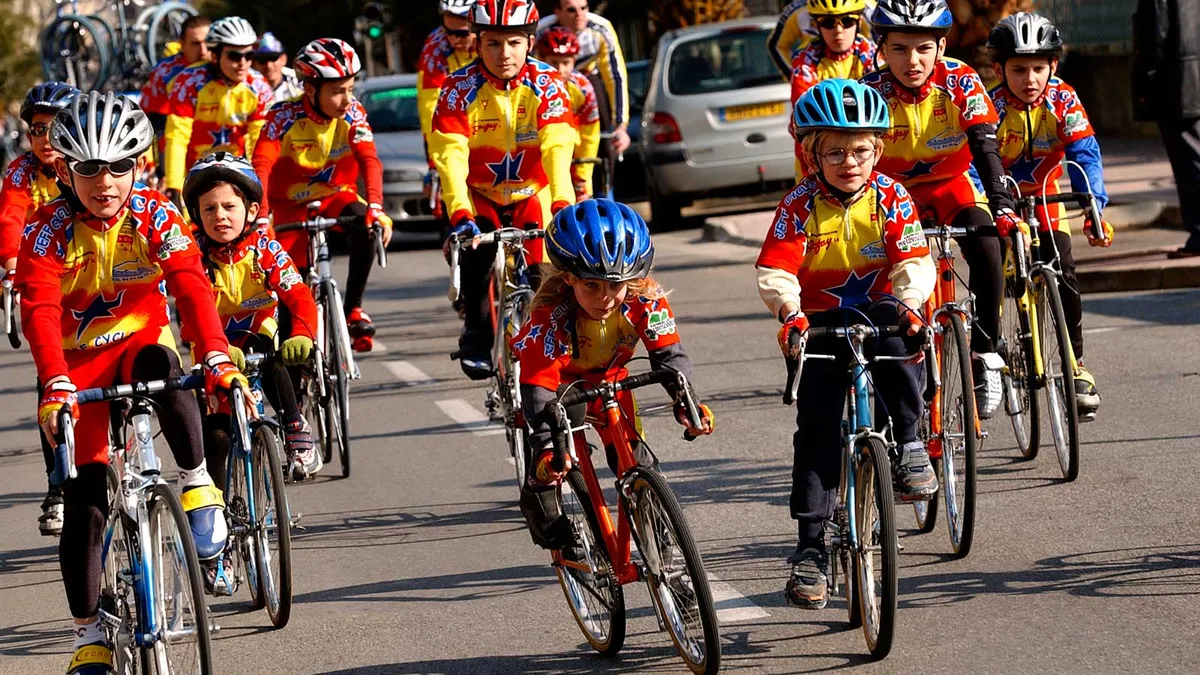Parents, if you don’t already ride then you should. It's much easier to get involved in your child’s interest in cycling from the saddle. They'll appreciate the support, and you'll get fit too.
So once they've begun their journey into bike riding, how do you help them on their way to cycling stardom? Start with an appropriate bicycle and some basic gear (a helmet is a must-have; our guide to beginner's kit is here), and your son or daughter's journey to ‘being Cav’ can begin.
The factors to consider are:
- The cost
- Organising rides
- Joining a club
- Growing - and getting faster and stronger
- Cycle-mad kids
The raw cost
Cost is the first hurdle for a parent about to open the cycling floodgates to a child. Good bikes aren’t cheap. Bikes that are cheap aren’t usually very good. (You can read our Buyer's Guide to Kids' Bikes here.)
Because kids grow fast, they could grow out of a correctly sized bike within a year, so it’s easy to see why some parents debate the ‘value’ of spending several hundred pounds on a bike.
But buying a series of cheap, heavy, poor performing bike-shaped-objects as they grow is simply a recipe for them to take up swimming or running. And you won't get your money back when it comes to selling them.
Invest in their passion, though, maybe by having to make some sacrifices, and get a half decent new or second-hand (or even third-hand) lightweight, correctly sized bike and you might be planting a seed for cycling that will grow with them for the rest of their lives.
If you’ve only ever run in workman’s boots, a pair of trainers will seem like a dream. So it is with a decent bike. Quality bikes stay in tune longer, bear the cost and effort of upgrade, require less maintenance and are better to ride in every way.
A visit to your local bike shop and a simple web trawl will reveal a massive and ever-growing choice of proportionately sized and intelligently equipped kids' bikes. Buying on Ebay and similar sites is also worth considering, as is buying through a local cycling club.
A good bike also holds its market value better than a bargain basement ‘looky-likey’.
The opportunity for your kid(s) to ride a quality bike, learn from it and love the sport, and still make enough on resale to put a fair dent in the cost of the next one (assuming it’s been cared for), should not be underestimated.

The cost is the first hurdle you'll need to clear
Organise rides
Before they become teenagers, there are a few things your child will need you to do. The first is to organise rides. The school playground is a good place to meet other parents of wannabe cyclists and to join forces for group rides – maybe a ride to a local park for a picnic, a cycle path to a cafe or, for the more adventurous, exploring the local bridleways.
Safety is a prime concern for any parent, and while we can't deny children have died while cycling, the numbers are small (six in the UK in 2013), and it is still possible to venture onto roads safely with new young riders. It just requires planning and good sense.
With enough teacher/parental momentum, any UK school can add cycling to the curriculum. In-Gear-Coaching, for example, was started by teachers at Benton Park School in Otley. Not only did it result in cycling being added to the regular curriculum via a Go-Ride facility, but it turned into a successful cycle training company, taking the skills and passion for safe cycling to schools across Yorkshire and beyond.
Alongside such private ventures is Bikeability, the old National Cycling Proficiency scheme in a new wrapper. Bikeability provides official, regulated cycle training (for road safety rather than furthering their sporting prowess) for junior and secondary school age kids countrywide. Our guide to essential cycling skills is here.
Pupils who cycle tend to be happier, healthier and likely to deliver better academic results. It's backed up by stats – educationally, physically and emotionally, kids who exercise with activities like cycling are a benefit to any school. (Read more about the benefits of cycling here.)
Embracing the likes of Bikeability is a win-win for you, the child and the school. The result is an empowered child with cycling road sense, who’s ready for a lifetime of cycling adventures.
Join a club
Once your child is road safe and mustard keen to ‘be a cyclist’, it's time to channel that enthusiasm. In Britain we have a strong cycling club scene, most of which have a junior section. Many cater for pre-teens with organised rides, events and races. Others might need some prompting, but generally, most are keen to embrace the young.
Clubs are also a great source of pre-owned bikes and kit; kids grow fast and cycling can be expensive. Tapping into the friendly support network that clubs offer can be a massive help, both logistically and financially – especially as the hobby evolves into a passion.
As kids get older, so youth-savvy clubs can provide appropriate support, practical advice and the opportunity to ride more. Most kids like to be social and feel part of a group, and if that group is semi-structured then the activities end up with a purpose, even if in the beginning the sole purpose is just having a laugh on two wheels. Usually the moment they get their first club jersey is the spark that ignites the fire…

Joining a cycling club and doing some training is a great way of starting out
Getting faster and stronger
For kids – at least in the early stages of being at a cycling club – coaching beyond basic good form isn’t key, enjoying the experience is. As kids become youths - at around 11 - their strength and stamina naturally increase, and the concept of ‘personal improvement’ starts to appear: ‘I’d like to be faster, so I need to be stronger.’
Good clubs build better cyclists this way, guiding youngsters on how to be faster and stronger through exercises and drills, but not necessarily with a focus on racing (though most clubs have a strong racing theme).
One club that really works well to integrate kids and youths into their fold is Chippenham Wheelers. One of the biggest clubs in the south west, it helps youngsters become smarter, faster cyclists, some of them going on to become good racers.
Wheelers has great coaches, offering tons of friendly, low pressure advice and regular opportunities to ride. It runs a club logbook, where young riders earn points for their part in club activities and rides at all levels – everything from attending club events, to helping at events, to completing set rides.
The club also operates distance awards, like in swimming, from two miles up to 100. The youngsters find it easy to understand and a great incentive to become stronger for their own gain, not beating other riders. That comes with time and the requisite desire.
Another example of a big cycling club is the London Phoenix Club who also meet up for regular rides – both road and off-road – while one further north is the Manchester Wheelers, a club with a proud heritage (cycling since 1883!) but who are always happy to welcome new members.
Go to the British Cycling website and find out which clubs are near to you. And while you're there, why not join up? The benefits are many and varied.
How to deal with a cycling-mad child
Even if you have a local friendly club, the average cycling mad child will want or need to ride a lot more than a weekend club run and a week-night session. This is where riding a bike becomes a lifestyle – going to and from school, the shops, the swimming pool, friends’ houses, grandparents' houses all become bike riding opportunities for the young, and training opportunities for older kids.
If, as parents, you want to support your kids’ desires to be ‘proper cyclists’, the best you can do is ride with them. (Here's a good starting point: our guide to cycing with the family.)
Seb Pecchia is a dad to two young kids. He’s a late convert to cycling, but he's become obsessed. Cycling is like that. “I got the bug. Bad,” he says. “But I realised that not only was this great for me, a personal escape and way to fitness, it’s a great way to spend more time with my wife and kids.
"We changed our car to a posh van big enough that we can lob all the bikes in. Whenever we go anywhere, we take our bikes – just in case the chance to ride somewhere new crops up. My kids don’t watch DVDs in the back seats, they scan the quality of the Tarmac! They’re mega into it. I think we’re all carrying the cycling gene now and we’re a better family for it.”

